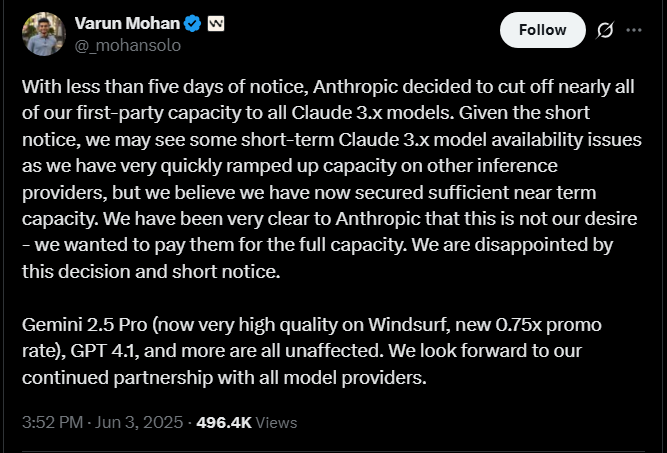Anthropic Abruptly Terminates Windsurf’s Access to Claude Models
Windsurf will lose direct API access to Claude 3.5 Sonnet and all Claude 3.7 variants in fewer than five days. Windsurf never secured direct access to Claude 4 despite expectations.
Introduction
On June 3, 2025, Windsurf chief executive Varun Mohan revealed on X that Anthropic had abruptly revoked almost all of Windsurf’s first-party access to Claude 3.x models with less than five days’ notice. Mohan said Windsurf had been ready to pay for the full allocation, but Anthropic’s decision—made just weeks after Windsurf’s three-billion-dollar acquisition by OpenAI—forced the company to scramble for alternative inference providers, warning users of possible short-term disruptions while assuring that capacity had now been restored.
Summary
Anthropic’s abrupt decision to revoke nearly all of Windsurf’s first-party access to Claude 3.x models stemmed from a confluence of strategic and competitive factors rather than a simple payment dispute. Although Windsurf expressed a willingness to pay for full capacity, Anthropic had previously bypassed Windsurf when rolling out Claude 4, hinting at evolving tensions as Windsurf was acquired by OpenAI. Observers suggest that Anthropic’s move was designed to limit data sharing with a direct competitor, forcing Windsurf to resort to more expensive third-party and “bring your own key” solutions. Windsurf’s users now face short-term availability issues, and the platform has been compelled to pivot to alternative inference providers while highligh
ting broader competitive dynamics between Anthropic and OpenAI.
Background
Windsurf is an AI-native integrated development environment used by over a million developers worldwide, and it was recently acquired by OpenAI for a reported three billion dollars. Historically, Windsurf offered direct integration of Anthropic’s Claude models, including Claude 3.5 Sonnet, Claude 3.7 Sonnet, and Claude 3.7 Sonnet Thinking, to provide high-quality AI coding assistance. On June three, twenty twenty-five, Windsurf’s CEO announced that, with less than five days’ notice, Anthropic had cut off nearly all of Windsurf’s first-party capacity to those Claude 3.x models, forcing a rapid shift to alternative arrangements for both free and paid users.
Strategic and Competitive Dynamics
Anthropic’s decision appears to be driven largely by competitive considerations relating to Windsurf’s acquisition by OpenAI, a direct rival in the generative AI market. Windsurf’s purchase by OpenAI consolidated two formidable forces: OpenAI’s ChatGPT ecosystem and Windsurf’s robust AI coding platform, generating concern at Anthropic that OpenAI could leverage Claude’s data to enhance its own models. A common theory within the developer community is that Anthropic wished to prevent OpenAI from harvesting query and response data to improve ChatGPT, especially given OpenAI’s deep pockets and ambition to dominate AI-assisted coding. Further, Anthropic’s pattern of favoring other partners over Windsurf when launching Claude 4 exacerbated these tensions. While Windsurf was left without direct access to Claude 4 Opus and Claude 4 Sonnet on their release day, competitors such as Cursor and GitHub Copilot secured immediate integration, signaling Anthropic’s preference to collaborate with platforms not owned by OpenAI.
Pricing, Capacity, and Technical Constraints
Contrary to speculation that a payment dispute prompted the cutoff, Windsurf made it clear that it was prepared to pay for full capacity of Claude 3.x models. In a public statement, Windsurf’s CEO emphasized that they wanted to pay for the full capacity and were disappointed by the decision and the short notice. Despite this willingness, Anthropic revoked direct capacity, resulting in a pivot to more costly and complex workarounds. Windsurf introduced “bring your own key” support, allowing developers to connect their personal Anthropic API keys to access Claude 3.x and Claude 4 models, but this approach shifts costs directly onto individual users and can fluctuate based on usage.
Analysis indicated that Windsurf now depends on third-party inference providers for Claude 3.x capacity, leading to limitations on free and trial users and potential developer churn if costs rise or access remains unreliable. Some observers also pointed to underlying infrastructure constraints at Anthropic as a partial factor, noting that Anthropic faces scaling and resource limitations compared to larger players like Google and OpenAI. However, while infrastructure pressures might explain some capacity reductions, the timing and exclusivity of Windsurf’s cutoff—occurring just after Windsurf’s OpenAI acquisition—underscore a deliberate strategic choice rather than purely technical necessity.
Exclusion from Claude 4 Launch
Anthropic’s decision to withhold direct Claude 4 integration from Windsurf on the May twenty-second twenty twenty-five launch further illuminated the competitive rift. While other AI coding platforms such as Cursor and GitHub Copilot secured immediate access to Claude 4 Sonnet and Opus, Windsurf users were forced to use the bring-your-own-key option or switch to alternative models like Gemini 2.5 Pro, which offered a promotional rate to ease the transition.
READ THE REST OF THE ARTICLE FOR $5 Dollars!





